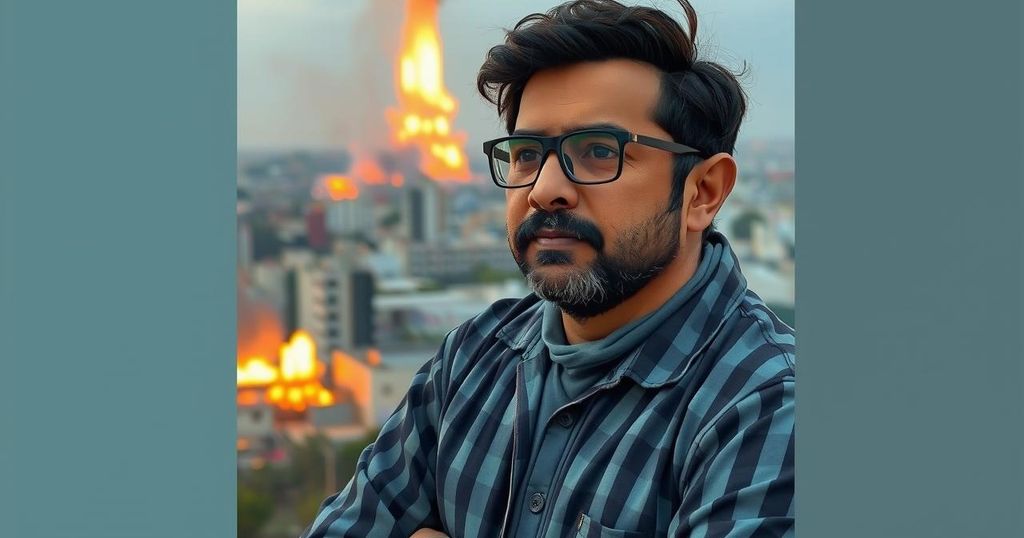The family of Mohammad Nizam, a Bangladeshi worker killed in an Israeli airstrike in Lebanon, blames Israel for his death and demands an end to the ongoing conflict. Nizam’s brother expressed profound grief and frustration over the loss, while alarming death tolls in Lebanon highlight the dire consequences of military aggression in the region.
In the wake of an Israeli airstrike in Lebanon that claimed the life of Mohammad Nizam, a 31-year-old Bangladeshi worker, his family has condemned the actions of the Israeli government, attributing sole responsibility for his death to Tel Aviv. Nizam lost his life on Saturday afternoon while stopping at a coffee shop en route to his workplace in Beirut. Bangladesh’s Ambassador to Lebanon, Javed Tanveer Khan, confirmed the tragic news. Mohammad Jalal, Nizam’s elder brother, expressed his heartbreak during an interview, stating, “Israel is solely responsible for the death of my brother. This war should be stopped without any delay.” He shared his concerns about Nizam’s safety amid the escalating Israeli offensives in Lebanon, revealing, “Since the beginning of recent Israeli attacks in Lebanon, I have been worried about Nizam’s safety. But I couldn’t imagine this tragic end to my brother’s life. If I could have sensed this outcome even a little bit, I would have brought him back at any cost.” The ongoing conflict has led to a staggering death toll in Lebanon, nearing 3,000 casualties since late September, as reported by the Lebanese Health Ministry. Additionally, over 13,300 individuals have sustained injuries resulting from air and ground assaults that have increasingly targeted civilian and medical facilities. Jalal lamented the heavy human cost of the conflict, questioning, “I don’t understand how many innocent lives need to be sacrificed to satisfy the whims of the Israeli leadership. It’s simply inhuman, insane and cynical.” In light of the war, a significant number of Bangladeshi nationals, estimated between 70,000 and 100,000, remain in Lebanon, many employed in labor and domestic roles. Following the outbreak of aggression, approximately 1,800 Bangladeshi workers registered for repatriation, with the first flights, organized by the Bangladeshi government in collaboration with the UN’s International Organization for Migration, facilitating the evacuation of some individuals from Beirut last month. Nizam, who had lived and worked in Lebanon for 12 years, did not enlist for an evacuation flight, as his brother noted, stating, “He was planning to return home soon by the end of this year. But now all of our dreams for a happy reunion have faded away with this sudden blow.” The family has made requests to have Nizam’s body repatriated; however, officials have indicated that this is currently unfeasible due to the ongoing hostilities. Despite the circumstances, Jalal hopes for cooperation from authorities, stating, “Now I am waiting to see my brother’s face for one last time and bury him in our village. But I have no idea whether it would be possible or not amid this war situation. I don’t know when I will be able to see his face.”
The recent violence in the Middle East, particularly involving Israeli airstrikes in Lebanon, has resulted in significant civilian casualties, prompting widespread condemnation. The death of Mohammad Nizam is a stark reminder of the human cost of ongoing conflicts, as many foreign nationals live and work in the affected areas. The Bangladeshi government is increasingly concerned for the safety of its citizens in Lebanon, where a considerable number are engaged in labor and domestic work. The situation highlights not only the immediate dangers posed by military actions but also the long-lasting impacts on families and communities.
The tragic loss of Mohammad Nizam serves as a poignant example of the toll that international conflicts impose on innocent lives. His family’s calls for an immediate cessation of hostilities reflect a broader outcry for peace amidst escalating violence in the region. As the death toll continues to rise, the plight of foreign workers in areas of conflict accentuates the urgent need for humanitarian action and the protection of civilians.
Original Source: www.arabnews.com






